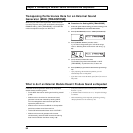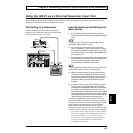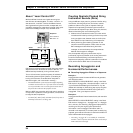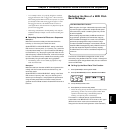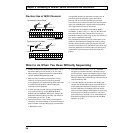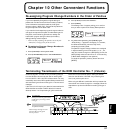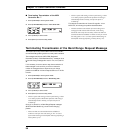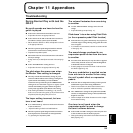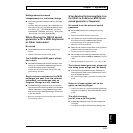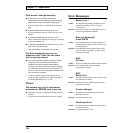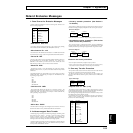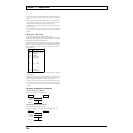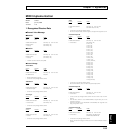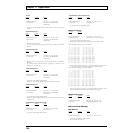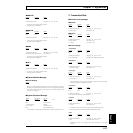
100
Chapter 11 Appendices
● Is the TONE “1:2 BALANCE” setting (p. 52) set to “50”
or “-50”?
→ Change the setting to a value closer to “0” and check
operation.
The built-in effects don’t work
● Is the EFFECTS setting item “REV SEND LEVEL” (p.
75), “CHO SEND LEVEL” (p. 74) set to “0,” or “MULTI-
FX SW” (p. 53) set to “Off”?
→ Select a type other than “Off.”
● Are the “REV SEND LEVEL,” “CHO SEND LEVEL,”
and volume-related Multi-effect parameters set to
appropriate values?
→ Set them to appropriate values.
● Is the three-digit display blinking “Edt” to indicate
that the unit is in EFFECT BYPASS mode?
→ Press [EFFECTS] to release the Bypass function (p. 75).
● The GR-33’s built-in effects are exclusively for use
with the internal synth sounds. They are not applied to
the sounds of the guitar itself.
→ You can apply external effects for the guitar to only the
guitar sounds by using the GUITAR OUT jack. (If you
wish to use a single amp for both the guitar and synth
sounds, you should also use the GUITAR RETURN jack
as well.) (p. 15)
● If the “Cho Send Level (Chorus Send Level)” or “Rev
Send Level (Reverb Send Level)” function is selected,
make sure that the expression pedal (p. 47) is not
rocked back all the way.
→ Depress the expression pedal.
The pitch of the synth sounds doesn’t
change in the same way as the pitch
of the guitar sounds
● Some tones (such as percussion instruments and effect
sounds) show different changes in pitch than with the
guitar. This is not a defect.
● If Harmonist is on, scale changes for synth sounds are
different from the guitar when “HAR/ARP SELECT”
(p. 82) is set to “Harmony All” or “Harmony 1&2.”
Noise with subtle undulations is hear
in extremely high registers
● This is a phenomenon peculiar to digital sound
generators known as “aliasing noise.” It may be
audible when using the slide technique or the Pitch
Shift function, but it is not a defect. The GR-33 is
designed to minimize such noise during guitar play.
Pitch doesn’t change smoothly
● Is COMMON “CHROMATIC” set to a value from
“Type1” to “Type3”?
→ Set CHROMATIC to “Off” for patches that require
continuous changes in pitch (p. 42).
● Is the Bend Data Thin function (p. 95) in use? Using
this function may result in a slight loss of smoothness
when pitch changes, even during normal play.
→ Do not use the Bend Data Thin function when it is not
needed.
“Battery Low!” appears in the display
when the power is switched on
● This is a warning that means that the internal battery
which maintains user patch and system setting data is
almost dead. If this message appears, data may be lost
is the battery is not replaced quickly.
→ Contact servicing by your dealer or qualified Roland
service personnel.
When Changing Patch Settings
The display suddenly starts flashing
● In a parameter where the [STRING SELECT] button is
valid and you select “ALL” (all strings) or “5-6” (strings
5 and 6), the blinking display indicates that the current
settings differ between strings.
● During EFFECTS editing, a blinking “Edt” indicates
that the bypass function is ON.
The sound doesn’t vary when the
settings are changed
● the GR-33’s Attack, Release, and Brightness settings
are intended to adjust the original data belonging to
each tone. This means that the range of change differs
according to the tone, and some tones may not show
much of a change.
● Is the setting being changed one of the seven settings
that can be made independently for each string (see the
following item), and is the setting affecting only a
particular string?
→ Use the [STRING SELECT] button to set it to “ALL.” (p.
35)



